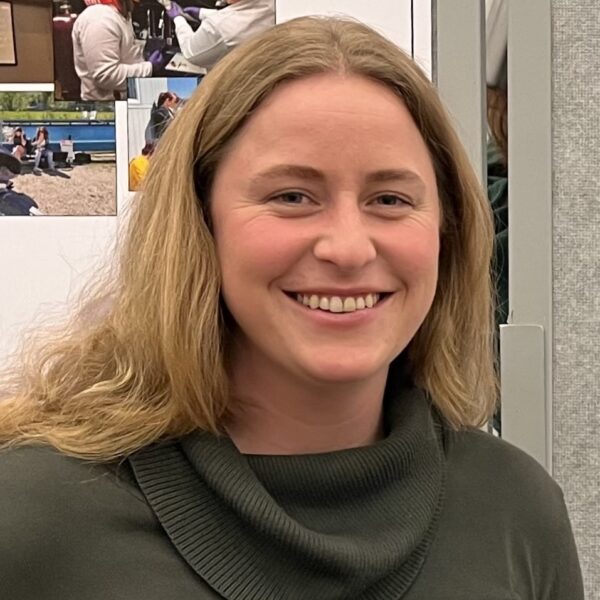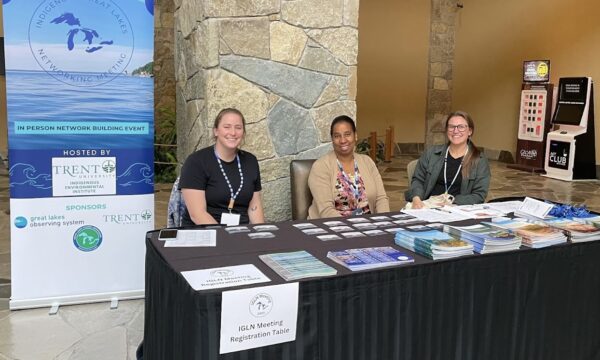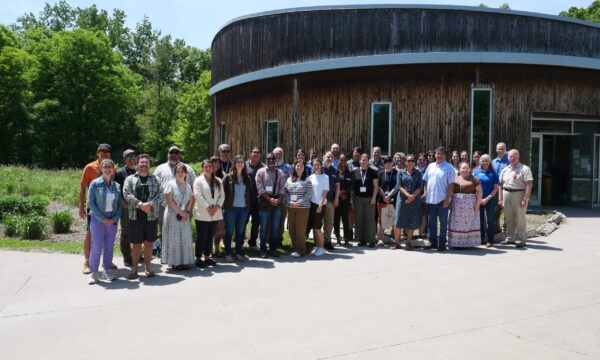In 2021, while she was completing her masters thesis research, Emma began her work with the Indigenous Great Lakes Network initiative (IGLNi) as a research assistant in a working group at Trent University. In that role she conducted research to help create an environmental scan of Indigenous-related research and monitoring projects that were taking place in the peer-reviewed literature. Her time as a research assistant for the initiative gave Emma significant experience in community-based research leading to her helping to facilitate workshops and take on more event planning and coordinating. Ultimately, the network affiliates made the decision that such a network would be something that would help to advance their communities’ research and monitoring priorities, and the IGLNi officially convened in person for the first time in October of 2023.

Emma Pirie earned her natural science focused Bachelor of Science degree at the University of Toronto. She continued her education at Trent University, and recently earned her Master of Arts degree in Sustainability Studies. The focus of her thesis examined the ways in which Indigenous Knowledge and Western Science are brought together.
Today, IGLNi is still in the early stage of development. The structure of the network is yet to be officially organized. The conversations that make actions must take place between the network participants, supporters and funders, and the IGLNi administrative hub. This is a product of the network’s emphasis on community driven decisions. And that’s where Emma and her new role come in. As the IGLNi’s first Network Coordinator, Emma helps facilitate the goals and objectives of the Network, whether that’s through activities like knowledge sharing, capacity building and community learning, or youth engagement. The formation of her role was a goal explicitly expressed by IGLNi participants, and it is Emma’s priority that the network continues to operate in an ethical and transparent manner, and is continuously responsive to the priorities of the communities that it serves.
Emma has been in the Network Coordinator role for a short time only (hired at the end of September 2024), yet she is already working on crucial components of the network, like developing a strong communication system that will enable regular and efficient contact with network participants and affiliates, as well as other supporting organizations and agencies. Informing network participants about upcoming opportunities (funding opportunities, research initiatives, and other relevant organizations’ programs), keeping everyone on track with their goals, and continuing to survey the participants about what they are working on and how the network can help facilitate are all immediate and ongoing tasks of Emma’s.
Short Term Research Priorities identified by the Network:
ecosystem conservation and protections:
- shoreline clean up
- status of species at risk
- moose management
- effects of commercial fishing
- fish stocking and aquaculture
data collection and technology:
- GIS mapping
- remote sensing
- ROV lakebed mapping
Long term priority topics:
- forest rehabilitation
- water security
- food sovereignty
- shipping and industrial impacts
- effects of climate change on the environment and natural disasters
- fish tracking studies
- mussel watch and control
- management of fish populations, guided by Indigenous Knowledge
- hazardous waste removal – related to mining
- environmental committee formation
- Youth and Elder Council, Regional Council, and Governance

Emma with Trent University Team at first IGLNi Meeting in October 2023.
As a network, IGLNi is attempting to reduce the barriers to overcoming challenges to meet these goals. The Network hopes to facilitate the sharing of resources, helping communities gain access to research personnel, funding dollars, training, etc. The vision for the network will be set by the participants, and IGLNi, through Emma, will facilitate accordingly.
Emma’s words on why she finds this work important and what the value of the network is:
“This work is important because it is rooted in and driven by community needs and priorities. And I think that is especially important considering the history of many Indigenous communities being left out of critical conversations or decision-making processes which concern the land, water, and resources that hold economic, cultural, and health significance to many communities within the Great Lakes Basin.
I think it is easy to be motivated in my role as a coordinator and for a network like this, because in this particular circumstance, the network is grounded in and built upon the needs of participants and communities. Working directly with people and supporting their research priorities is what keeps me passionate about what I do.”
Contact and Followup:
The IGLNi’s office is at Trent University in the Indigenous Environmental Institute (IEI), which serves as the administrative hub “or secretariat” of the network. If you are a group, organization, or agency that would like to collaborate with the IGLNi, please reach out to Emma and share any opportunities. Collaboration could include informing the network about training sessions, funding opportunities, and research initiatives that you or your organization have in the works, that may be of benefit to network participants.
Emma’s Email: emmapirie@trentu.ca
Emma is excited about where the network is going and feels grateful to be part of a team focused on making a real impact. And she wants to thank GLOS and the initiative funders for their financial support.

IGLNi Meeting attendees outside the Ojibway Nature Center (photo provided by Alex Duncan)
The Indigenous Great Lakes Network initiative (IGLNi) came from a concept designed within the Indigenous Environmental Institute (IEI) at Trent University, identifying the need and desire for diversity in Great Lakes research and policy. With collaboration between the GLOS staff, Smart Great Lakes initiative members, and IEI faculty (Mary-Claire Buell, Chris Furgal and Barbara Wall), phases for network establishment were designed and put into action. With network operations currently housed in IEI, the goal of the network as a Hub is to be facilitators and a referral system for collaboration between Indigenous communities, researchers, and Great Lakes organizations.